Gun violence
LIHUE — Roy Saito is the owner of Gold-Express Inc., where he deals in everything from precious metals to antique war memorabilia.
An avid gun enthusiast, Saito is wary of some of the new laws passed this year that further tightened restrictions on gun owners in Hawaii, specifically, a recent measure allowing police to temporarily confiscate firearms from people who are deemed by a judge to be a danger to themselves or to others.
“I can see the government taking that too far to the extreme,” he said of Act 150, signed by Gov. David Ige in June. “The law needs to have a due-process clause in it. You cannot just come to someone’s house and confiscate based on a rumor.”
Hawaii is among the dozen states that have approved some version of a “red-flag law” since the 2018 mass shooting at Marjory Stoneman Douglas High School in Parkland, Fla.
“I can’t figure out the justification for passing the law in the first place,” he said, noting that the law was not preceded by a local increase in firearm-related violence or public outcry for stricter gun control.
In the wake of two deadly mass shootings in El Paso and Dayton, Ohio that rocked the nation last weekend, locals and lawmakers and law-enforcement officials talked with TGI about gun control and whether tougher laws are needed.
Bronson Bautista, owner of Armory Kauai, one of the island’s few gun shops, sells a product that he said is already heavily regulated and highly scrutinized.
Bautista said the vast majority of people “don’t understand the first thing about guns,” and state lawmakers are no exception.
“They try to restrict us from owning things they don’t understand,” he said, using as an example a 2017 bill that would have made it legal for hunters in Hawaii to use silencers on their guns.
The bill failed, Bautista said, in part because legislators voted based on “too much perception of what goes on in the movies.”
“As a hunter, you can use a tool that can make you much more efficient,” he said, explaining why noise supressors would be useful to hunters, who help keep several animal populations on Kauai in check. “Nobody wants to say they miss, but when you do, you make so much noise you scare away any other game in the area.”
Bautista said Hawaii’s strict gun laws can place difficulties on business owners, who sometimes struggle to attract new customers who may give up in the face of the time-consuming permit application and registration processes.
“From a retail standpoint it’s hard,” he said. “It’s tough on small businesses for sure.”
Bautista said the key to preventing gun violence has more to do with mental health than legislation, and attributed the lack of gun violence on Kauai to the familial sense of community felt by the people who grow up on the island, something he believes is missing from many places elsewhere in the country.
“They have a people problem,” he said. “People definitely treat people different here than on the mainland.”
Ultimately, Bautista concluded, “No law is going to make us safe.”
The state’s gun laws rank among the strongest in the nation. The Giffords Law Center to Prevent Gun Violence, an organization that publishes annual nationwide reports on gun control, gave Hawaii’s gun laws an A- rating, among the best in the country.
Hawaii had fewer gun deaths per capita than any other state in 2017, according to the Centers for Disease Control and Prevention, and incidents of gun violence are particularly low on Kauai.
A report published in January by the state attorney general’s office showed that firearms were used in just 8% of all robberies on Kauai in 2017. Assaults involving firearms were even more rare, at just 4.4%.
Those figures are roughly half of statewide averages, and a fraction of rates seen in the rest of the United States. Nationwide data collected by the FBI show that, in 2011, firearms were used in 41% of robberies and 21% of aggravated assaults.
In an interview Friday, state Senate President Ron Kouchi called Hawaii’s gun laws “some of the toughest in the country,” but attributed part of the county’s low gun-related-crime rates to the attitude and culture of the people.
“In Kauai, we have an incredible amount of responsible gun owners,” he said, pointing to two large segments of the island’s population that are known for being knowledgeable about weapons and serious about gun safety — hunters and military veterans.
Kouchi said the challenge for legislators is protecting the rights of hunters who use guns to feed their families and pay the bills, while maintaining public safety by keeping laws in place that allow law enforcement to keep guns out of the hands of criminals.
“Finding that balance is always the tricky part,” he said.
State Rep. James Tokioka said Thursday that he couldn’t think of any measures he would like to see added to the state’s gun laws, which he described as the strictest, “and, in my opinion, the most reasonable” in the nation.
Tokioka said he supported Hawaii’s new red-flag law, preventing potentially dangerous gun owners from accessing their firearms.
“I’m sure some people think that’s too much,” he said, and emphasized the guns would be confiscated on a temporary basis. The act calls for judges to issue a one-year “gun-violence protective order,” which Tokioka called “a cooling-off period,” that was “the whole purpose of the bill.”
Tokioka said firearms are less of a concern on Kauai than elsewhere, partly because gun owners here are mostly “hunters who use them to provide food for their families.”
“On Kauai, you rarely hear them tooting the horn because it’s a small community and you probably know that person,” he said.
Saito remains relatively positive about state and county gun regulations in general. He has no problem with basic background checks, which he called “good, common sense,” but Saito did point out an inconsistency in the firearms-registration process he would like to see changed.
“The way they do it here is terrible,” he said, explaining that the permit required by state law to purchase a rifle or a shotgun has to be renewed every year, while the same permit for handguns never expires.
According to Saito, the process is time-consuming and expensive for gun enthusiasts and vendors like himself, who frequently purchase long guns.
Roy Asher has been with the Kauai Police Department longer than any other officer on the force. He is one of four assistant chiefs, and heads up the department’s Administrative Services Bureau.
Because of Hawaii’s geography and remote location, Asher explained, the KPD doesn’t have to deal with a lot of illegal firearms smuggling, a major concern for many mainland law-enforcement agencies, particularly those tasked with monitoring hundreds of miles of land borders with states that may have looser gun regulations.
Instead, Asher said, the most problematic gun-control issues on Kauai stem from legally-registered gun owners who either lack proficiency or fail to maintain control over their weapons.
Before buying a gun, Kauai residents have to take a firearms-safety course and apply for a permit to acquire a gun, followed by a two-week “cooling-off period.” During that time, the KPD runs a background check on the applicant. Asher said some of the common disqualifiers are prior felony convictions, a history of mental health issues and medical-marijuana-card registrations.
Once the permit is approved and the new weapon is purchased, the new gun owner must return to the police department and register the serial number before the firearm is considered legal.
“From that point on, you’re on your own,” Asher said.
The registration process is appropriate and effective, in Asher’s opinion, but, he said, “you don’t need a legally-registered gun to commit a crime.”
When asked what could make gun regulations more effective, he said he would like to see legislation establishing rules for firearm proficiency — “Can you handle it?” — and retention — “Can you keep it secure?”
Asher also addressed the right-to-carry issue. For concealed and open-carry permits, Hawaii is a “may-issue” state, meaning county police chiefs can issue the permits on a discretionary basis. Asher said Kauai residents “can certainly try” to get either permit, although he has seen only two applications granted in his 30-plus years with the KPD.
The last instance was about three years ago, Asher said, adding that the permit was issued for a limited time to one person who “showed credible evidence and documentation that their life was being threatened.”

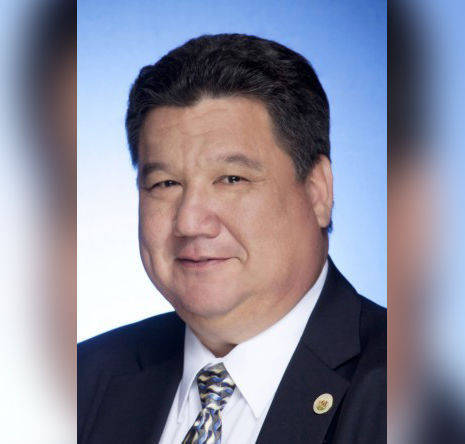
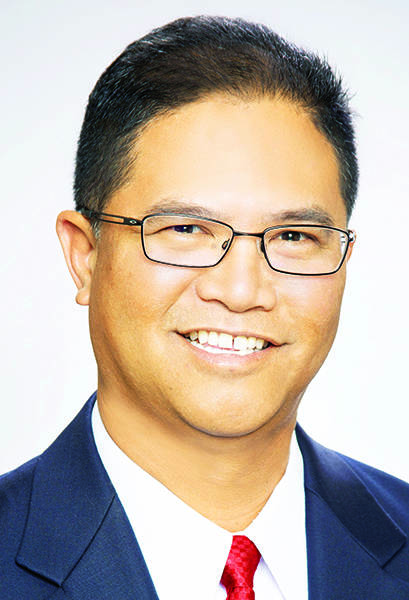
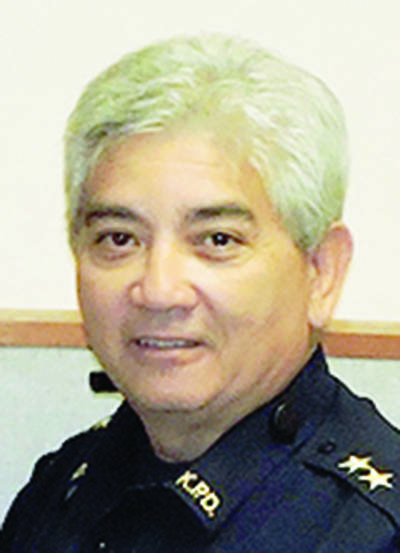

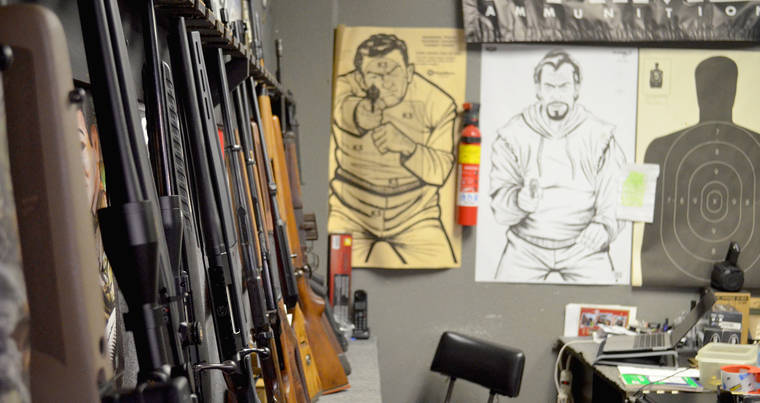
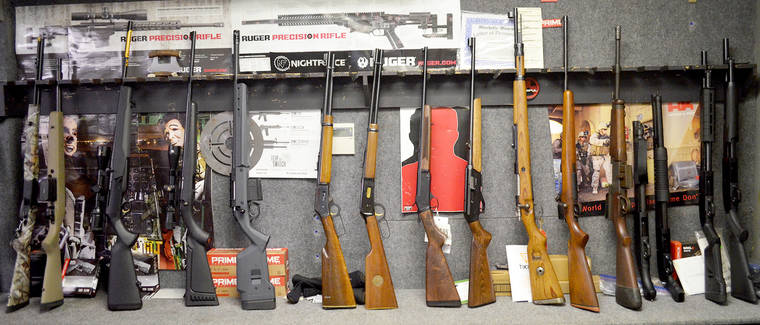
Bronson Bautista, owner of Armory Kauai, sells a product that he said is already heavily regulated and highly scrutinized.
That is a good thing. Any argument to the contrary is facetious.
Bautista said the vast majority of people “don’t understand the first thing about guns,”. We are not idiots.
The first thing about guns is that they are primarily used to kill things. Animals and people. Even in defense against someone else with a gun who is threatening. That’s clear to anyone with a brain.
Oh sure, some people just like target practice (practicing for what? Golfing? Tennis? Or killing?), and some just like to collect guns for nostalgia sake. Neither activity requires owning or collecting assault weapons.
Ultimately, Bautista concluded, “No law is going to make us safe.” Perhaps not, but a law prohibiting ownership of assault weapons is going to make us safer. A whole lot safer.
If Mr. Bautista cannot make a living without abiding by existing regulations AND WITHOUT SELLING ASSAULT WEAPONS, he should figure out a different way of making a living. The public owes nothing to Mr. Bautista and other, like Jim Rosa, who sell guns and ammo (and especially assault weapons) for a living. They owe the public a more secure, safer future, not the other way around.
“The way they do it here is terrible,” he said, explaining that the permit required by state law to purchase a rifle or a shotgun has to be renewed every year, while the same permit for handguns never expires.”
This statement is incorrect, and im sure Mr. Saito was misinterpreted. Long gun permits (rifle and shotgun) allow for unlimited purchase for the duration of the permit. A handgun permit is only issued for a SINGLE handgun, and the purchaser needs to provide the serial number ahead of time to obtain the permit. In other words, its a lot harder to purchase a handgun than it is to purchase a rifle or shotgun.
No permits need to be renewed unless someone intends to purchase new firearms.
Last I heard, red flag or Extreme Risk Protection Order (ERPO) laws are the only untenable positions taken by President Trump. That said, politicians who support this notion will regret the day they ever heard of red flag laws. Their legacies will carry a Supreme Court scolding and perhaps be a landmark of their careers. But not to worry. Red Flag laws will be overturned soon enough.
The Supreme Court isn’t about to jeopardize its own reputation by reducing the ability of private citizens to defend themselves. It’s especially important because currently, half the nation’s murders occur in only 63 counties while the other half are spread across the other 3,081 counties. Said another way, 15 percent had one murder and 54 percent of the nation’s counties had no murders at all.
These laws were created to dilute the power licensed to the psychiatric community and transfer it to unqualified persons the democrats can influence, e.g., local judges and disgruntled aunts. These confiscation laws are still being trumpeted by democrats because their usual gun control arguments have been lopsided, illogical losers.
Democrats and weak minded Republicans are victims of the bum’s rush. They’ve been hoodwinked by Bloomberg’s rhetoric and haven’t read his 2018 data. It reveals gun homicides declined seven percent, firearm injuries declined 10 percent, fatal child shootings (under 18) declined 12 percent and unintentional shootings plummeted 21 percent. Generally, since 1991, the murder rate has fallen by 45 percent and the overall violent crime rate has fallen by 48 percent.
Additionally, shooting incidents involving students have been declining since the ’90s. During that time, citizens were buying a record number of firearms. In 2018, more than 26 million firearms were purchased, a number exceeded only by 27.5 million in 2016 when purchasers were mortified that Hillary might be elected.
Further, a December 2018 Gallup Poll revealed that gun control is last on a list of what Americans cite as the most important problem facing the U.S. Seems government is the most important problem and immigration is second most important. Obviously, the socialist-democrats are pushing a solution in search of a problem.
Unarguably, our government cannot be trusted with the 2nd Amendment, just as our founders warned us. The primary problem with this nationwide hysteria to enforce red flag laws is none are crafted with sufficient protections for the accused. Apparently, we’ve been deluding ourselves that the U.S. judiciary would rather let ten guilty parties go free than convict one innocent person.
Additionally, these laws generally place enormous responsibility and pressure on police officers and judges to dispense pretrial punishment, just in case an owner might be mentally afflicted. This kind of punishment is overly severe to be based on amateur opinions afforded by all the red flag laws enacted thus far. I have no doubt that the Supreme Court will strike these laws down but in the meantime, many firearms owners will suffer needlessly. Lawsuits are sure to follow.
Since we’re dealing with mentally troubled persons, any law should include analysis by licensed psychiatrists, one chosen from each side, before an indictment. Doubtlessly, we all know of judges and law officers who are far from qualified for such professional undertakings. I also doubt that they’d volunteer to diagnose mental illness if their jobs depended on doing it correctly.
This movement makes it clear that democrats want control without responsibility. I used to wonder why democrats saturate media outlets with soothing pleas for conversation instead of acting on their clear and ultimate goal of total confiscation. I assumed they stopped short of the extreme because they know firearms owners won’t tolerate confiscation without unimaginable fury.
Fact is democrats will temporarily settle for controlling little things like angry partners, bayonet lugs, ammunition taxes, bullet shapes and so on. But it’s still part of a common democrat flimflam. Eventually they’ll again get around to universal background checks that are impossible to manage without universal registration.
They need a universal firearm registry because it fundamentally transforms 140 million owners into dependents. Once they know who the owners are, they’ll choose which of them are allowed to be licensed. It’s the consummate entitlement. The democrat party cannot survive without more than half the nation being dependent on the government. Democrats trade entitlements for votes. It’s the heart of their strategy.
Justice demands that the accused be afforded at least a modicum of professional analysis and an official opinion by two or more psychiatrists. Democrats screech in the streets if denied a full measure of due process but close their eyes on the subject of self-defense by firearm. These laws open the doors to scorned partners, angry neighbors, children seeking a parent’s wealth and arrogant judges.
The natural next step for any Nazified government was to codify empowerment of mothers, fathers, brothers, sisters, sons, daughters, uncles, aunts, cousins, friends, neighbors, judges, police officers, boyfriends, girlfriends, classmates, teachers, faculty, employers, co-workers and everyone except those actually qualified to judge mental competence.
And you can count on democrats finding new restrictions that violate due process. Soon they’ll want to choose an upper age limit for people to be “allowed by the government” to keep and bear arms as guaranteed by the 2nd Amendment. It makes me wonder about the motive for Red Flag ERPO laws.
Individual permits to acquire handguns are required for EACH handgun purchased and must be used with 10 days of issue. A permit to acquire a long gun is good for 1 year from the date of issue. No limit for the amount of long guns that can be purchased within the 1 year permit period.
Also, a firearms safety training course or hunter education course is only required for a handgun permit. No course is required for a long gun permit.
I think at least a Hunter’s Safety Course is needed for a long gun.